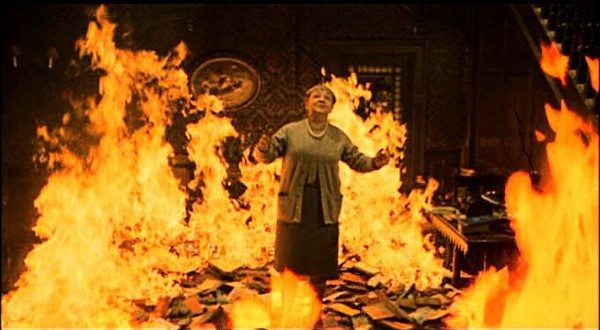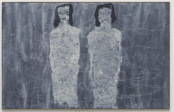[dropcap style=”font-size:100px;color:#992211;”]A[/dropcap]re we boring ourselves to death? ‘Your not living you’re just killing time!’ shrieks Guy Montag the protagonist of Ray Bradbury’s ‘Fahrenhiet 451’. Montag is the thoughtful ‘fireman’ who tires of burning books after his imagination is caught by some inspiring prose; addressing his wife and her friends while they languish in front of banal television programs and make chit chat, he rages against the sloth and lack of curiosity of his imagined time.

Still from the 1966 film‘Fahrenheit 451’ The old lady prefers to die with her books rather then live without them.
Fahrenheit 451 is an inspired title, totally non-descript and innocuous until you learn that is the temperature that book paper catches fire and burns. While at work with the other firemen ransacking the book-filled house of an old woman before the inevitable burning, Montag accidentally reads a line in one of her books: “Time has fallen asleep in the afternoon sunshine”. This prompts him to steal one of the books. The woman refuses to leave her house and her books, choosing instead to light a match and burn herself alive. This act disturbs Montag who begins to question his life and the authorities.
“Time has fallen asleep
in the afternoon sunshine”
Reporting in the Telegraph Heidi Blake claims we are indeed boring ourselves to death she’s right isn’t she? Like so much relevant literature Bradbury’s 1953 warning of a vacuous culture may well have come to be in our own Trumpian times,
“Researchers, who studied 7,000 civil servants over 25 years, say that people who complain of boredom are more likely to die young,” Heidi Blake
The research highlights dull jobs and the ‘me, me, me’ culture but there’s more to it and it may be that we just don’t have the stomach for a challenging culture,
“The most important thing to know about Fahrenheit 451 is that it is explicitly not about government censorship. (Bradbury was so firm on this point he once walked out of a UCLA class when his students tried to insist it was so.)…The firemen aren’t burning books on the orders of some shadowy Big Brother. They’re doing it, protagonist Guy Montag is told, because society as a whole turned away from the scary cacophony of knowledge, from the terror of differing opinions and the burden of having to choose between them, from deep and troubling thoughts,”Chris Taylor, 2012
Taylor reminds us that Bradbury was not repeating the important messages of ‘1984’ he was doing something different, pointing the finger at the audience themselves and trying to illicit a little self reflection.
Is it ok to watch banal television? to seek always to have fun and to be in a state of comfortable stupefaction? of course no rational person would say yes to this and most of us would recognise that cultural input needs to be balanced like a diet perhaps; no one wants to spend long with someone who only eats junk food and equally we all get weary of those who starve themselves piously, but perhaps the balance has tipped too far?
In 1984 Orwell examined: totalitarian control, censorship, historical revision and paranoia. Those themes were and are important; sadly it will probably always be necessary to be vigilante against the intrusion of dictatorial power. But most of us don’t live in the world described by Orwell and we are at a comfortable distance in the west from that kind of intrusion into our personal freedom.
Banality though is another story. for something to be banal is not as many forgivably think, all to do with boredom. A lecture on complex mathematics may strike some as boring even deadening but it could never accurately be called banal. Strangely in a culture so saturated in platitudinous Instagram quotes and trite reality television the word banal is rarely used in conversation or in reviews. This may be because it rings of elitism referring to something as boring does not betray any pretention but to say TOWIE is vapid or conventional or indeed banal, would be to elevate ones self above the program and its makers in a way that has become unfashionable in our supposedly egalitarian time.
In ‘1984’ Orwell has Winston confronted by a terrible statement ‘If you want a picture of the future, imagine a boot stamping on a human face — forever.’ Orwell ‘1984’
Its such a violent thing to say, its brutality is clear and it touches not only the human but also the animal part of us, horror, we fear it. We recognise the danger and shrink from it appropriately. Thousands of years of bitter and hard fought survival have prepared us for that enemy.
But what of Bradbury’s message? The animal part of us which is attuned to recognise physical threats, pain and aggression seems powerless against the quick sand of banality, like a powerful domestic dog neutered by its loving owners and overfed into sloth we may be experiencing something we don’t have the senses to fully perceive, the end of our truly higher functioning the ability to appreciate complex notions, subtleties and metaphor. In our time now its no exaggeration to say that much of the reading which takes place is with literature that is banal: celebrity biography, lame lifestyle columns and information which is all to affirming even when its sensationalised as it is in an episode of Jeremy Kyle.
OOO inoculation for the invisible pandemic
In the emerging philosophy of OOO (object orientated ontology) Graham Harman, the founder, privileges the ideas of José Ortega y Gasset and his thinking around metaphor,
“(metaphor) is the annihilation of what both objects are as practical images. When they collide with one another their hard carapaces crack and the internal matter, in a molten state, acquires the softness of plasm, ready to receive a new form and structure” Ortega
The philosophy in general places the ability for human beings to create and appreciate metaphor as one of the most important things that we can do “Time has fallen asleep in the afternoon sunshine” gave Montag pause for thought it cant be immediately explained away it requires some interpretation and a sophistication of thinking there is comfort in knowing that there are people invested in helping us appreciate this ability. Only a vulgar literalist is fully at risk from the stultifying aspects of our lazy mutually constructed prison and if you think I’m a snob for saying so then it may already be to late for you!

Michael Eden is an artist and researcher working in London and the south east, his artistic practice is concentrated on painting and he divides his time between this and lecturing in art history and contextual studies.
















